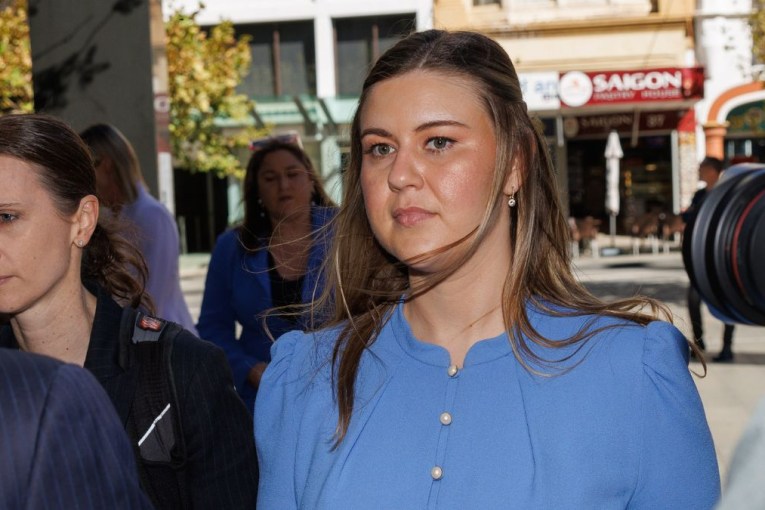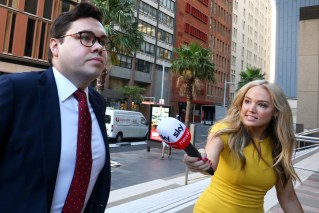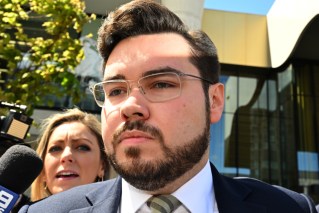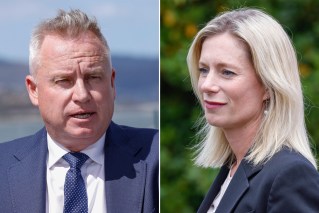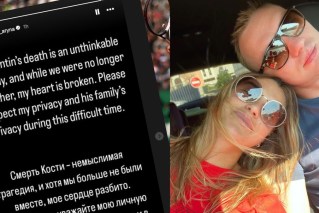WikiLeaks founder Julian Assange’s legal team to fight US extradition after arrest in London

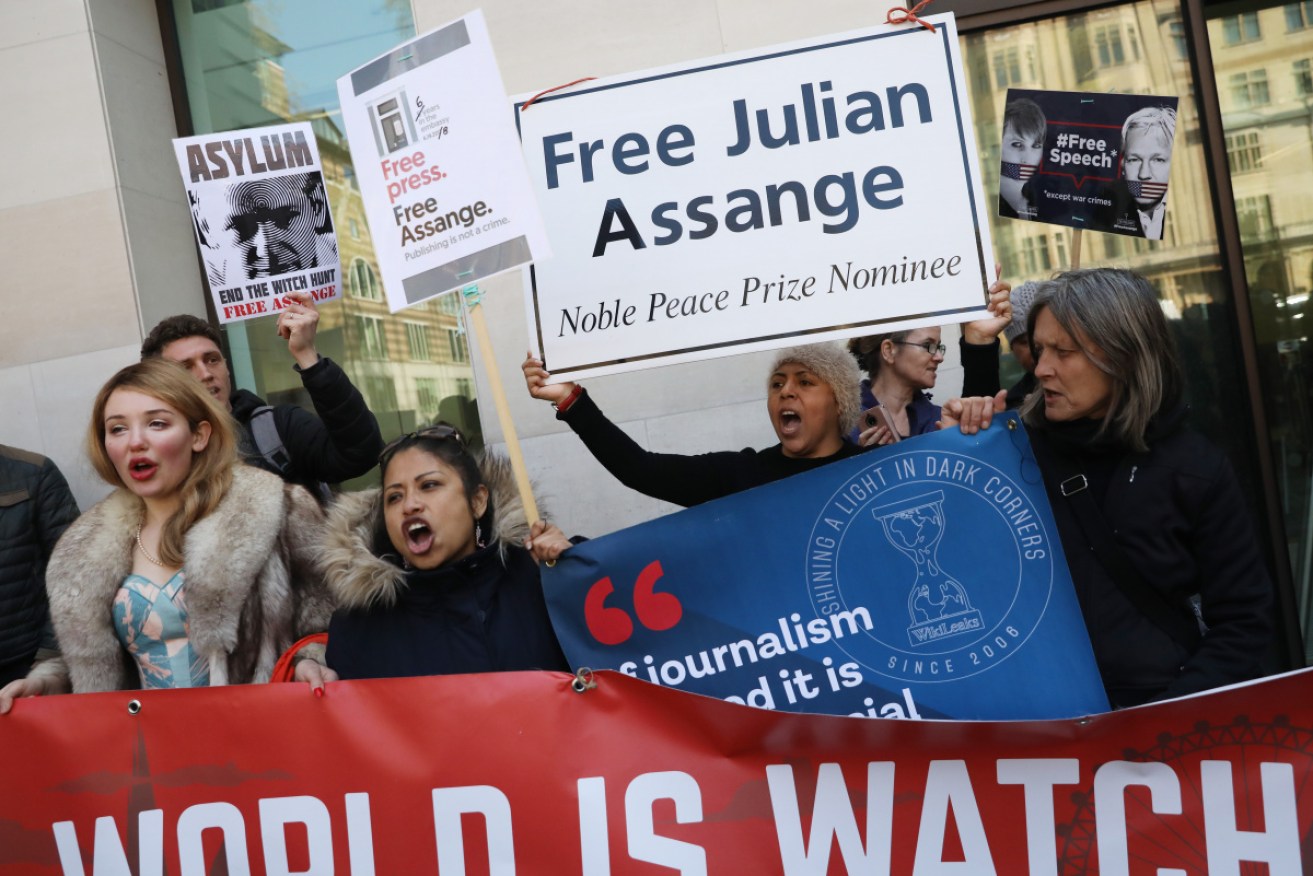
As he was preparing to spend his first night behind bars, supporters quickly gathered outside Westminster Magistrates Court. Photo: Getty
WikiLeaks founder Julian Assange’s lawyers will fight his extradition to the United States on conspiracy charges after his dramatic arrest at the Ecuadorian embassy in London.
On Friday morning (AEST), Assange’s lawyer Jennifer Robinson confirmed her client would be fighting the the extradition request, saying it set a “dangerous precedent” if journalists could face US charges for “publishing truthful information about the United States”.
Ms Robinson said she visited Assange in the cells at central London police station, where he thanked supporters and said: “I told you so”, having for many years predicted he would be extradited to the US if he left the embassy.
In dramatic scenes on Thursday night (AEST), the one-time editor-in-chief of whistleblowing organisation WikiLeaks was forcibly removed by London police after having his political asylum revoked after seven years holed up inside.
Looking vastly different from when he entered the secured building, a frail and bearded Assange resisted as he was dragged down several steps by officers and bundled into a police van, yelling “This is unlawful, I’m not leaving”.
He was driven to the Westminster Magistrates Court where he pleaded not guilty of failing to surrender in 2012, facing extradition to Sweden to face questioning in a sexual assault case.
His defence team was late to the hearing, so Assange pulled out a book by Gore Vidal and started reading it while prosecutor Erin Watkin left the room to fetch them.
His lawyer, Liam Walker, argued Assange had reasonable grounds to not adhere to his bail conditions as he believed he would not be treated fairly by British courts and would be extradited.
Mr Walker said Assange’s belief was “now beyond reasonable doubt” before giving the example of a conflict of interest in his earlier case before Senior District Court judge Emma Arbuthnot, whose husband Tory Lord Arbuthnot had been targeted by WikiLeaks.
“He relies upon previous hearings, and what I submit on his behalf, were compromised hearings that illustrate the unfairness he was subjected to,” Mr Walker told the court.
He said his client had been “subjected to a tribunal that was clearly conflicted in its ability to judge Mr Assange impartially”.
District Judge Michael Snow was incensed by the defence case, chiding Assange as “shameful” choosing not to give evidence but rather make an “assertion about a senior judge” in front of the press.
“He has had throughout senior judges who have looked at his case with great care and his assertion that he has not had a fair hearing is laughable and, I’m afraid, the behaviour of a narcissist who cannot see beyond his own self interest,” he said.
The 47-year-old Australian was found guilty of breaching bail and will appear again on May 2 via video link to face the extradition case.
https://twitter.com/_JustinStevens_/status/1116279690212155392
American prosecutors revealed Assange was now facing extradition to the US for conspiring in 2010 with former Army intelligence analyst Chelsea Manning to break into a secure Department of Defence computer.
Hours after he was dragged out of the embassy, US officials announced he had been charged with a single count of conspiracy to commit computer intrusion.
Australian-born Assange faces up to five years in a US prison if convicted on the charges.
Longtime friend and visitor to the embassy, former Baywatch star Pamela Anderson, took to Twitter on Friday morning saying Assange looked “very bad”.
“I am in shock..I couldn’t hear clearly what he said? He looks very bad.
How could you Equador ? (Because he exposed you). How could you UK. ?,” she wrote.
She later posted a “Don’t Extradite Assange” petititon which had gathered almost 38,000 signatures by Friday afternoon.

Kristinn Hrafnsson, editor of WikiLeaks, and barrister Jennifer Robinson speak to the media after the arrest of Julian Assange. Photo: AAP
British Prime Minister Theresa May hailed the news in parliament, to cheers and cries of “Hear, hear!” from lawmakers.
Foreign Minister Marise Payne said Assange would continue to receive “the usual consular support” and that consular officers would try to visit him.
Meanwhile, Prime Minister Scott Morrison said the US push to extradite Assange had nothing to do with Australia.
“When Australians travel overseas and find themselves in difficulty with the law, they face the judicial systems of those countries,” Mr Morrison told ABC television on Friday.
US President Donald Trump in 2016 professed his love of WikiLeaks after it was instrumental in exposing his presidential rival, Hillary Clinton’s, use of a private email server for government business.
On Friday morning he told reporters he knew nothing about the organisation.
“I know nothing about WikiLeaks. It’s not my thing and I know there is something having to do with Julian Assange,” the President said during a meeting with South Korean President Moon Jae-in.
“I’ve been seeing what’s happened with Assange,” he said, referring to the London arrest, adding “it’s not my deal in life”.
President Trump, who often expressed his love of WikiLeaks during the 2016 presidential campaign, says following the arrest of Julian Assange on Thursday: "I know nothing about WikiLeaks. It's not my thing." pic.twitter.com/smT8o7La95
— NBC News (@NBCNews) April 11, 2019
WikiLeaks claimed “powerful actors, including the CIA, are engaged in a sophisticated effort to dehumanise, delegitimise and imprison [Assange]”.
Former CIA intelligence agent turned whistleblower Edward Snowden was among high-profile supporters, also sharing a link to the indictment.
Mr Assange took refuge in Ecuador’s embassy in 2012 after British courts ordered his extradition.
The case was dropped, but supporters have said Assange feared he could be extradited to the US if he left the embassy over the publication of US diplomatic and military secrets by WikiLeaks.
This man is a son, a father, a brother. He has won dozens of journalism awards. He's been nominated for the Nobel Peace Prize every year since 2010. Powerful actors, including CIA, are engaged in a sophisticated effort to dehumanise, delegitimize and imprison him. #ProtectJulian pic.twitter.com/dVBf1EcMa5
— WikiLeaks (@wikileaks) April 11, 2019
Assange’s falling out with the Ecuador embassy
Assange’s relationship with his hosts collapsed after Ecuador accused him of leaking information about President Lenin Moreno’s personal life.
Mr Moreno had previously said Assange had violated the terms of his asylum.
Mr Moreno said he had asked Britain to guarantee that Assange would not be extradited to a country where he could face torture or the death penalty.
“The discourteous and aggressive behaviour of Mr Julian Assange” as well as “hostile and threatening declarations” by an unnamed organisation against Ecuador made the asylum of Assange “unsustainable and no longer valid,” Mr Moreno said in a video message on Twitter.
Mr Moreno said Assange repeatedly violated the conventions of diplomatic asylum: “He particularly violated the norm of not intervening in the internal affairs of other states.”
UPDATE: Julian Assange has been further arrested in relation to an extradition warrant on behalf of the United States authorities. He remains in custody at a central London police station. https://t.co/rK3mtlsPBE pic.twitter.com/kipiWbflOh
— Metropolitan Police (@metpoliceuk) April 11, 2019
Assange’s arrest came less than 24 hours after WikiLeaks held a media conference alleging that Ecuador spied on his legal and medical visits, stole legal notes during a court hearing, secretly co-operated with the United States and tried to extort 3 million Euros ($4.7 million) from him.
URGENT: Ecuador has illigally terminated Assange political asylum in violation of international law. He was arrested by the British police inside the Ecuadorian embassy minutes ago.https://t.co/6Ukjh2rMKD
— WikiLeaks (@wikileaks) April 11, 2019
Less than a week ago, Assange was warned by a high-level source that he would be expelled within “hours to days”.
Assange’s relations with his embassy hosts have deteriorated in the past year. Last year, Ecuador cut off his internet and issued a nine-page memo demanding he steer clear of sensitive topics and concentrate on the “wellbeing, food, hygiene and proper care” of his cat.
-with AAP
